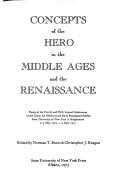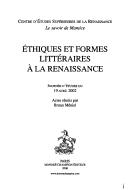| Listing 1 - 7 of 7 |
Sort by
|
Book
ISBN: 9782503532479 2503532470 Year: 2010 Publisher: Turnhout : Brepols,
Abstract | Keywords | Export | Availability | Bookmark
 Loading...
Loading...Choose an application
- Reference Manager
- EndNote
- RefWorks (Direct export to RefWorks)
Le Plaisir est-il le Bien ? La Renaissance reprend à son compte cette question débattue depuis le Philèbe et le livre X de l’ Ethique à Nicomaque. Au XVe siècle, Lorenzo Valla, dans son dialogue Sur le Plaisir de 1430 tranche dans le sens d’une identification entre le plaisir et le Bien suivi un siècle plus tard par Erasme qui n’hésite pas dans l’Epicurien (1533) d’assimiler le Christ à Epicure. Et Montaigne dans sa critique du stoïcisme stigmatise le danger des vertus immodérées qui excluent le plaisir. Le problème que posait Platon de la possibilité d’un faux plaisir à nouveau fascine les esprits. Et si le plaisir pensé, imaginé, rêvé pouvait réveiller les sens, toucher le corps ? Et si les barrières s’effaçaient entre le corps et l’âme ? Réhabiliter le plaisir, c’est pouvoir assumer sa part d’ombre, le déplaisir, refuser l’abstraction de leur dissociation. Accepter le plaisir, c’est accepter la mort. C’est l’une des leçons paradoxales de Peines d’Amour Perdues que la pensée baroque ne cessera d’illustrer. La Renaissance reste vigilante, comme l’avaient été les périodes précédentes, car il est un plaisir auquel il ne convient pas de laisser libre cours : le bon plaisir du monarque absolutiste.
Pleasure --- Pleasure in literature --- Plaisir --- Plaisir dans la littérature --- History --- Histoire --- Ethics [Renaissance ] in literature --- Ethiek [Renaissance ] in de literatuur --- Genot in de literatuur --- Jouissance dans la littérature --- Lust (Gevoel) in de literatuur --- Morale de la renaissance dans la littérature --- Plaisir dans la littérature --- Ethics, Renaissance, in literature --- Ethics, Renaissance, in literature. --- European literature --- English literature --- History and criticism --- History and criticism. --- 1400-1599 (Renaissance) --- 1450-1600 (Renaissance) --- Themes, motives --- Early modern, 1500-1700 --- Pleasure in literature - History and criticism --- European literature - Renaissance, 1450-1600 - History and criticism --- English literature - Early modern, 1500-1700 - History and criticism --- Plaisir (morale) --- Renaissance --- Congrès

ISBN: 0873952766 Year: 1975 Publisher: Albany State university of New York press
Abstract | Keywords | Export | Availability | Bookmark
 Loading...
Loading...Choose an application
- Reference Manager
- EndNote
- RefWorks (Direct export to RefWorks)
Courage in literature --- -Didactic literature --- -Ethics, Medieval, in literature --- -Ethics, Renaissance, in literature --- -European literature --- -Heroes in literature --- -Literature, Medieval --- -Congresses --- History and criticism --- -Congresses --- Congresses --- Congresses --- History and criticism --- Congresses --- History and criticism --- -Congresses
Book
ISBN: 9783447067720 Year: 2013 Volume: 28 Publisher: Wiesbaden : Harrassowitz,
Abstract | Keywords | Export | Availability | Bookmark
 Loading...
Loading...Choose an application
- Reference Manager
- EndNote
- RefWorks (Direct export to RefWorks)
In der Renaissance kam es europaweit zu einer grundsätzlichen Neubewertung und Pluralisierung des Heroischen: Einerseits setzte eine intensive Wiederbelebung antiker Helden-Vorstellungen ein, die nicht zuletzt die fürstliche und monarchische Selbstdarstellung prägte; andererseits erschütterte die Konfessionsspaltung den etablierten Kanon von Werten, an denen sich heroische Leistung messen ließ, und wuchs die Skepsis gegenüber einem nur militärischen Heldenkodex. Die Beiträge des interdisziplinären Sammelbandes untersuchen die Konstruktion und die medialen Bedingungen von Helden-Bildern in Geschichte, Kunst, Literatur und Wissenschaft der Renaissance: Figuren wie Herrscher und Krieger, heroische Frauen, humanistische Geisteshelden, Reformatoren und Heilige zeigen die synchrone Vielfalt in dieser Schlüsselepoche des europäischen Heldendiskurses.
heroes --- Comparative literature --- Thematology --- anno 1400-1499 --- anno 1500-1599 --- Héros (personnes) --- Heroes in literature. --- Littérature de la Renaissance --- European literature --- Morale de la Renaissance --- Ethics, Renaissance, in literature. --- Dans la littérature. --- Thèmes, motifs. --- Themes, motives. --- Dans la littérature.

ISBN: 2745315056 9782745315052 Year: 2006 Volume: 11 Publisher: Paris Honoré Champion Editeur
Abstract | Keywords | Export | Availability | Bookmark
 Loading...
Loading...Choose an application
- Reference Manager
- EndNote
- RefWorks (Direct export to RefWorks)
Literary semiotics --- anno 1500-1599 --- French literature --- Ethics, Renaissance in literature --- Littérature française --- Morale de la Renaissance dans la littérature --- History and criticism --- Congresses --- Histoire et critique --- Congrès --- Littérature française --- Morale de la Renaissance dans la littérature --- Congrès --- Congresses.
Multi
ISBN: 9781107039063 9781139856423 9781107516885 1107516889 1139856421 1107039061 1139892916 1107502551 1107501059 1107506484 1107514096 1107496985 1107503760 110843908X 9781139892919 9781107502550 9781107501058 9781107506480 9781107514096 9781107496989 9781107503762 Year: 2013 Publisher: Cambridge New York
Abstract | Keywords | Export | Availability | Bookmark
 Loading...
Loading...Choose an application
- Reference Manager
- EndNote
- RefWorks (Direct export to RefWorks)
David B. Goldstein argues for a new understanding of Renaissance England from the perspective of communal eating. Rather than focus on traditional models of interiority, choice and consumption, Goldstein demonstrates that eating offered a central paradigm for the ethics of community formation. The book examines how sharing food helps build, demarcate and destroy relationships - between eater and eaten, between self and other, and among different groups. Tracing these eating relations from 1547 to 1680 - through Shakespeare, Milton, religious writers and recipe book authors - Goldstein shows that to think about eating was to engage in complex reflections about the body's role in society. In the process, he radically rethinks the communal importance of the Protestant Eucharist. Combining historicist literary analysis with insights from social science and philosophy, the book's arguments reverberate well beyond the Renaissance. Ultimately, Eating and Ethics in Shakespeare's England forces us to rethink our own relationship to food.
Thematology --- English literature --- History of civilization --- anno 1500-1599 --- anno 1600-1699 --- Food in literature. --- Eating (Philosophy) --- Ethics, Renaissance, in literature. --- Dinners and dining --- Philosophy --- History and criticism. --- England --- Civilization --- Food habits --- Renaissance --- History. --- Eating --- Food customs --- Foodways --- Human beings --- Habit --- Manners and customs --- Diet --- Nutrition --- Oral habits --- Arts and Humanities --- Literature
Multi
ISSN: 11646152 ISBN: 2745309919 Year: 2004 Volume: 49 Publisher: Paris : Editions Honoré Champion,
Abstract | Keywords | Export | Availability | Bookmark
 Loading...
Loading...Choose an application
- Reference Manager
- EndNote
- RefWorks (Direct export to RefWorks)
Ideal, the --- Renaissance --- princesses --- General ethics --- anno 1500-1599 --- Caractères litteraires --- Caractères littéraires --- Character sketches--History and criticism --- Characterization (Literature) --- Characters [Literary ] --- Characters and characteristics in literature --- Ethics [Renaissance ] in literature --- Ethiek [Renaissance ] in de literatuur --- Karakterisering (Literatuur) --- Karakters [Literaire ] --- Karakters in de literatuur --- Karakterschetsen in de literatuur --- Literaire karakters --- Literaire portretten --- Literary characters --- Literary portraits --- Littérature--Personnages --- Morale de la renaissance dans la littérature --- Personages in de literatuur --- Personnages (littérature) --- Personnages littéraires --- Portraits [Literary ] --- Portraits littéraires --- Portretten [Literaire ] --- Princessen in de literatuur --- Princesses dans la littérature --- Princesses in literature --- Types littéraires --- Princesses in literature. --- Characters and characteristics in literature. --- Persona (Literature). --- Ethics, Renaissance in literature. --- Education of princes --- Princesses --- Personnages dans la littérature --- Persona (Littérature) --- Morale de la Renaissance dans la littérature --- Princes --- History. --- Political activity --- Education --- Histoire --- Activité politique --- Princesses dans la littérature --- Personnages dans la littérature --- Persona (Littérature) --- Morale de la Renaissance dans la littérature --- Activité politique --- France --- History --- Education of princesses --- Algemene ethiek --- het Ideaal --- prinsessen --- renaissance --- Persona (Literature) --- LITTERATURE FRANCAISE --- EDUCATION DES PRINCES --- NOBLESSE --- 16E SIECLE --- FRANCE --- THEMES, MOTIFS, ETC. --- 16E-17E SIECLES
Book
ISBN: 1139986562 1139991205 1316011763 1322066973 1316014002 1316002764 1107786150 131600726X 1316009505 1316005003 1107071933 1107419816 Year: 2014 Publisher: Cambridge : Cambridge University Press,
Abstract | Keywords | Export | Availability | Bookmark
 Loading...
Loading...Choose an application
- Reference Manager
- EndNote
- RefWorks (Direct export to RefWorks)
Written by a distinguished international team of contributors, this volume explores Shakespeare's vivid depictions of moral deliberation and individual choice in light of Renaissance debates about ethics. Examining the intellectual context of Shakespeare's plays, the essays illuminate Shakespeare's engagement with the most pressing moral questions of his time, considering the competing claims of politics, Christian ethics and classical moral philosophy, as well as new perspectives on controversial topics such as conscience, prayer, revenge and suicide. Looking at Shakespeare's responses to emerging schools of thought such as Calvinism and Epicureanism, and assessing comparisons between Shakespeare and his French contemporary Montaigne, the collection addresses questions such as: when does laughter become cruel? How does style reflect moral perspective? Does shame lead to self-awareness? This book is of great interest to scholars and students of Shakespeare studies, Renaissance studies and the history of ethics.
Moral conditions in literature. --- Ethics, Renaissance, in literature. --- Literature and morals --- Literature --- Morals and literature --- Ethics --- History --- Influence --- Moral and ethical aspects --- Shakespeare, William, --- Shakespeare, William --- Shakespear, William, --- Shakspeare, William, --- Šekʻspiri, Uiliam, --- Saixpēr, Gouilliam, --- Shakspere, William, --- Shikisbīr, Wilyam, --- Szekspir, Wiliam, --- Šekspyras, --- Shekspir, Vilʹi︠a︡m, --- Šekspir, Viljem, --- Tsikinya-chaka, --- Sha-shih-pi-ya, --- Shashibiya, --- Sheḳspir, Ṿilyam, --- Shaḳspir, Ṿilyam, --- Syeiksŭpʻio, --- Shekspir, V. --- Szekspir, William, --- Shakespeare, Guglielmo, --- Shake-speare, William, --- Sha-ō, --- Şekspir, --- Shekspir, Uiliam, --- Shekspir, U. --- Šekspir, Vilijam, --- Ṣēkspiyar, Viliyam, --- Shakspir, --- Shekspyr, Vyli︠e︡m, --- Şekspir, Velyam, --- Ṣēkspiyar, Villiyam, --- Shēkʻspʻiyr, Vlilliam, --- Ṣēkspiyar, --- Ṣēkspiyar Mahākavi, --- Ṣēkspiyar Mahākaviya, --- Sheḳspier, Ṿilyam, --- Shēkʻspir, --- Shakespeare, --- Śeksper, --- Шекспир, Вильям, --- Шекспир, Уильям, --- שייקספיר, וויליאם, --- שייקספיר, וו., --- שיקספיר, וויליאם --- שיקספיר, ויליאם --- שיקספיר, ויליאם, --- שכספיר, ויליאם, --- שכספיר, וילים, --- שכספיר, ו׳ --- שעפקספיר, וויליאם, --- שעקספיער, וויליאם --- שעקספיער, וויליאם, --- שעקספיער, ווילליאם --- שעקספיער, וו., --- שעקספיר --- שעקספיר, וו --- שעקספיר, וויליאם, --- שעקספיר, וויליאמ --- שעקספיר, ווילליאם --- שעקספיר, ווילליאם, --- שעקספיר, וו., --- שעקספיר, װיליאם, --- שעקספיר, װילליאם, --- שעקספיר, װ., --- שעקספער --- שעקספער, וויליאמ --- שקספיר --- שקספיר, וו --- שקספיר, וויליאם --- שקספיר, וויליאם, --- שקספיר, ווילים, --- שקספיר, וילאם --- שקספיר, ויליאם --- שקספיר, ויליאם, --- שקספיר, ויליים, --- שקספיר, וילים --- שקספיר, וילים, --- شاكسبير، وليم --- شاكسپير، وليم --- شكسبير، وليام --- شكسبير، وليم --- شكسبير، وليم، --- شكسبير، و. --- شكسپير، وليم --- شكسپير، ويليام --- شيكسبير، وليام --- شيكسبير، وليام.، --- شيكسبير، وليم --- شکسبير، وليم --- وليم شکسبير --- 沙士北亞威廉姆, --- 沙士比亞威廉姆, --- 莎士比亞威廉姆, --- 莎士比亞威廉, --- 莎士比亞, --- Ethics.
| Listing 1 - 7 of 7 |
Sort by
|

 Search
Search Feedback
Feedback About UniCat
About UniCat  Help
Help News
News